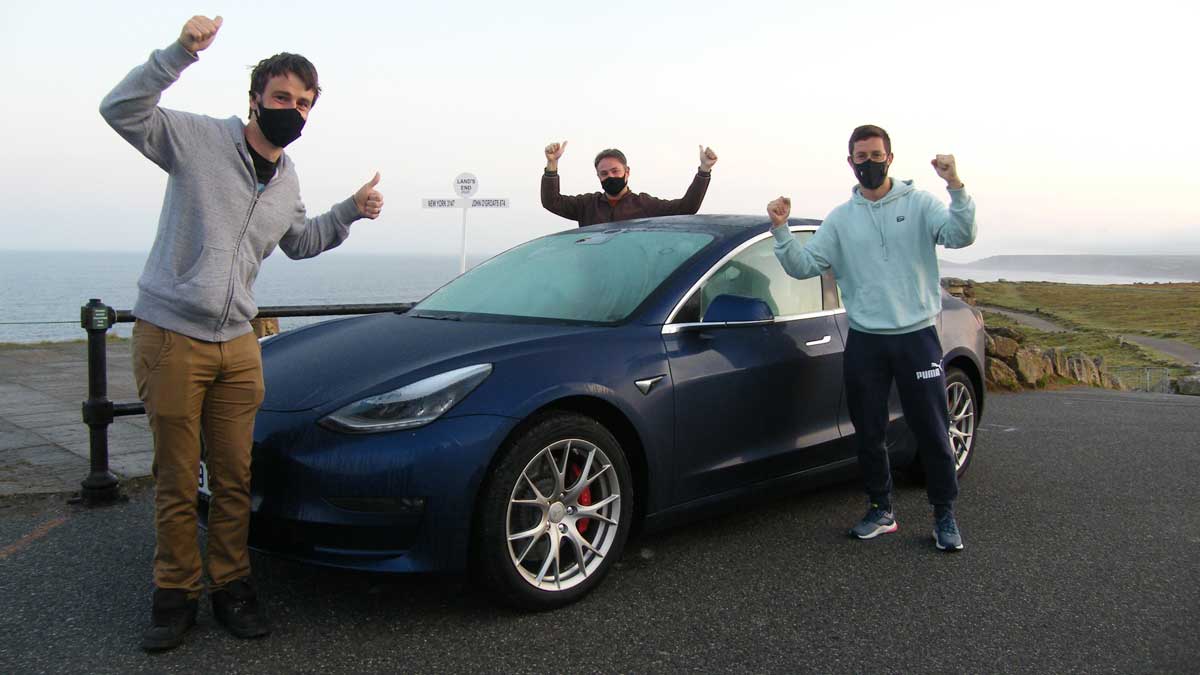|
Secretaris-Generaal VN
Geregistreerd: 18 mei 2005
Locatie: Limburg
Berichten: 50.259
|

Citaat:
Oorspronkelijk geplaatst door Micele

Al wat anders als die prutsers van testaankoop, met hun gatachterlijk ritje van Oostende naar de Ardennen met een EV die Ionity (of bepaalde snellaadpalen) nog niet vrijgeschakeld had.
Blijkbaar laatste nieuw laadrecord gehaald in UK. Toch goed voor een Guinness World Record. Wie weet ondertussen al verbroken.
Of trip van het N-O topje van UK, John o' Groats naar Land's End in Cornwall (Z-W) of 1348 km volgens google maps. |
Correctie de trip was 1376,3 km (de Tesla reed volgens zijn eigen trip planner)
Citaat:
https://thedriven.io/2020/09/15/tesl...d-to-cornwall/

Tesla Model 3 slashes charging time in 1,376 km trip from Scotland to Cornwall
Three electric car drivers have set a new electric vehicle (EV) record, charging for the shortest known time for the trans-UK trip that took them from the northern tip of Scotland to the souther-westerly tip of Cornwall.
According to Zero Carbon World, a UK charity that has donated more than 700 EV charging points across the UK and which sponsored the event, the three drivers spent just 1 hour, 31 minutes and 32 seconds charging the car on the 1,376.3 kilometre journey, easily breaking the previous record by more than two hours.
The line up of drivers included ABB FIA Formula E Championship electric racing car driver Alexander Sims, who was joined by Zero Carbon World trustee and chair Dean Fielding, and EV specialist David Peilow in a Tesla Model 3 Performance.
And according to Zero Carbon World, they were all very pleased with the result.
“We’re ecstatic to have achieved this incredible time, which is less than half that of the previous record,” said Fielding in a note by email.
Fielding says that the improvement in charging time was largely due to the ultra-rapid EV charging station installed by Ionity at Cullompton, near Exeter in Devon, and the increase in fast charging infrastructure at large.
“The attempt was in the planning for just two weeks, when David [Peilow] realised that a high-speed Ionity charger had been installed in Cullompton, Devon. This made it possible to attempt a new record with high-speed charging stations at suitable points along the way,” said Fielding.
He says that although the team planned their trip to achieve the record, the average electric car driver could just easily use a trip planner to do the same (although we note that charging speed will depend on the individual model, and that the Tesla has a charge rate of up to 250kW).
“Despite our planning for the record attempt, we feel that this achievement demonstrates that many EV drivers could easily make the trip without significant planning – just plot it in their satnav and go,” says Fielding.
“Lots of EVs use the CCS charging standard that we used along the way. The UK charging infrastructure has improved to a degree where such trips can be made, making EVs a viable and practical alternative to ICE vehicles.
“What’s even more remarkable is that the software used to calculate the trip suggested we would need 1 hour and 31 minutes of charging, and that’s exactly what we did. The capability to accurately predict real-world journeys helps eliminate the anxiety many feel about EVs and range.”
Along their journey, the Zero Carbon World team charged at three Ionity stations: Perth, Gretna Green, and of course Cullompton.

They also stopped at one Tesla Supercharger station in Essington, South Staffordshire, charging only for the time indicated by the trip planner.
“We didn’t overcharge the car at any time. We were mostly charging to somewhere in the 50-60 per cent region, with one of our charging stops taking the car to 80 per cent,” said Sims in a note by email.
“We would make it to the next charger with around 4-5 per cent remaining. David did all the calculations for us and it was very well predicted.”
Driving this way also means keeping an eye on energy consumption, and ensuring that an even speed and REGENERATIVE BRAKING is used to optimise driving range.
“We averaged 6.05km/kWh, with a charging efficiency of 97 per cent,” says Peilo, adding that in terms of carbon emissions the drive averaged 19.5g CO2/km.
“The Tesla Model 3 Performance was chosen for the record attempt due to its charging capacity, rate and range,” says Peilow.
“Not all EVs could achieve the charging time we did, but plenty of EV models are capable of comfortably making the epic road trip, simply by charging to 80 per cent rather than our minimal charges.”
“Since I last made this journey back in 2011, the charging infrastructure has improved dramatically across the UK. High-speed charging networks such as Ionity use the CCS charging standard that many EVs use.
“It’s fantastic to see the national charging network growing in the UK and across Europe to make such long journeys easy and accessible for more EV drivers.”
Zero Carbon World will be submit the record-breaking journey to the Guinness World Records to validate the attempt in the coming weeks.
|
speciaal groen kleurtje voor de neezeggers.
Aja met de ~10% zuinigere model 3 long range (modeljaar 2020) was de uitslag alvast nog wat beter: (reden ze met de aerovelgkappen? volgens de fotos alvast niet, nog enkele %-ten, zie tabel)
 https://teslike.com/
https://teslike.com/
Laatst gewijzigd door Micele : 6 maart 2021 om 13:38.
|